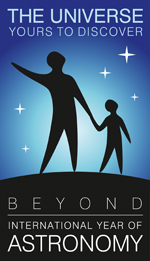This is the golden age of astronomy, interview by Catherine Cesarsky (IAU President)
9 January 2009
Catherine Cesarsky : This is the golden age of astronomy
Catherine Cesarsky, emeritus research director at the French Atomic Energy Commission (CEA) and researcher at the Paris Observatory, has been the president, since 2006, of the International Astronomical Union (IAU), which launched the International Year of Astronomy (2009).
Interview by Pierre Gaillard, Bureau of Public Information, UNESCO
What is the purpose of astronomy?
Astronomy is the science that allows humanity to try to answer questions it has always asked. Where do we come from? Where are we going? Are we alone in the universe? Using scientific means, we try to answer these questions, to understand how the universe works, how the universe came into being, along with its galaxies, stars and planets. To know if there are other planets in the universe and if they resemble ours. And, in a while, we will probably try to find out if they are inhabited by living beings, maybe even made of cells as we are.
How is astronomy faring today?
This the golden age of astronomy, thanks in large part to great advances in technology. Astronomy is a science that uses technology to the maximum and makes it advance as well, always going to the extremes of electronics, optics and mechanics.
Recent advances allow for methods of observation far superior to those we had in the past. For a long time, we studied only nearby galaxies that we call our near universe. Now we have much more sensitive telescopes and instruments, allowing us to see sources that are weaker. Usually, these sources are weaker because they are simply far away. And when we observe a galaxy that is very far away, since light takes a very long time to reach us, we see the galaxy as it was when it emitted the light that we are receiving. Today, we think that the universe is around 13.6 billion years old. We are able to observe galaxies that are barely younger than the universe.
What new advances does astronomy hold for coming years?
We are currently experiencing the first discoveries of galaxies that already existed very early on in the life of the universe. For the moment, we are discovering a few: the brightest. Later, with even more sensitive instruments, we will be able to understand how they were created, if they resembled the galaxies as they are now. We will be able to study their properties, which for me is something very interesting. We are also in the middle of precisely working out cosmological parameters, those that govern the expansion of the universe, its creation at the time of the Big Bang. There as well, we have a lot of potential progress. Finally, there are extra-solar planets that we began to discover a bit more than ten years ago because of their indirect effects. Now we know a few hundred. We know better and better how to find ones that resemble Earth, and soon we will study their characteristics.
Have all these developments changed the profession of the astronomer?
The day-to-day work of an astronomer has nothing to do with what it used to be. We have essentially two types of observational astronomy: astronomy on the ground and in space. It takes a long time to develop instruments for space, they must be perfect, we cannot afford to make any mistakes. Just proposing and carrying out an instrument project takes 15 years. The instrument is then taken on board a satellite and, to explore the solar system, another eight to ten years may be required before the probe reaches its destination. It takes a lot of patience!
And astronomers who carry out their observation on the ground use telescopes that no longer have anything to do with those of our predecessors. We now have telescopes with diameters of eight to ten metres and we are studying new ones with diameters in the order of 30m, and even 40m and more. Astronomers are no longer sat in front of their telescope, in an ice-cold dome, like in the past: with one eye glued on the star to make sure it does not leave the field. They now work in front of computers and do everything through remote control.
We are no longer satisfied with just visible astronomy. Between the ground and space, we scrutinize all wavelengths, from radio waves to gamma rays, which give us a much more complete view.
What will the International Year of Astronomy achieve?
The International Year of Astronomy was invented by the International Astronomical Union and - fortunately - UNESCO joined us very quickly! Our goal is to share with the rest of the world the wonder we feel as astronomers, faced with the mysteries of the universe.
We want all countries in the world - many of which have already created programmes - to get involved. And we want the public, the widest possible public, to be able to take part. By the end of the year, we would like everyone on Earth to have spent at least a short while with their attention turned to the sky. Or at least to have read something on the most recent discoveries, or reflected on our position in the universe.
Original source: http://portal.unesco.org/en/ev.php-URL_ID=44276&URL_DO=DO_TOPIC&URL_SECTION=201.html
Search IYA2009 Updates

National Nodes: 148
Organisational Nodes: 40
Organisational Associates:33
National Websites: 111
Cornerstone Projects: 12
Special Task Groups: 11
Special Projects:16
Official Products:8
Media Partners:22


